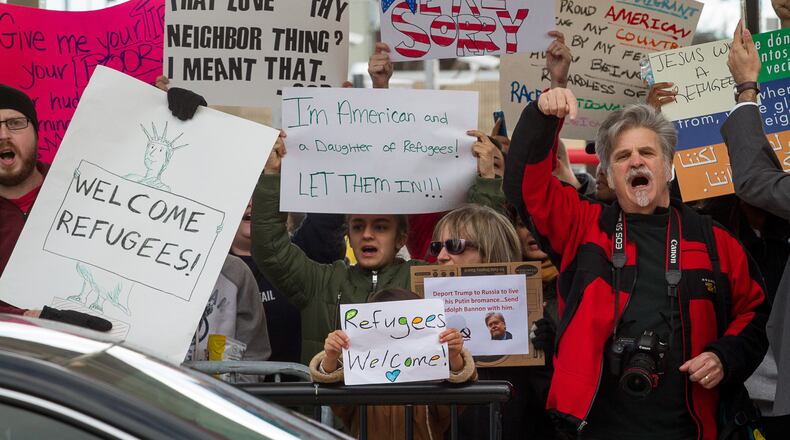If metro Atlanta becomes a hub of resistance to Donald Trump's presidency, it won't be because John Lewis stood up or because Sally Yates was pushed out.
Nor will it be spurred by stories of refugees from the world’s wars who have suddenly found their journey blocked — or the extra-large Southern hearts that were prepared to receive them. And still are.
But temperatures might rise because decades of Republican and Democratic strategy have staked Georgia’s economic future on an economy in which cash, goods and people can move — legally — across international borders with relative ease.
That may be about to change.
While TV cameras focused on airports that had suddenly become holding cells for foreign travelers, and the White House argued that a word perfectly suitable on Sunday and Monday just wouldn’t work on Tuesday, the draft of another White House executive order began making the rounds.
This one would restrict the flow of legal, educated foreign workers sought by companies in metro Atlanta, in Silicon Valley, and other regions where the emphasis is on technology and start-ups.
"Visa programs for foreign workers … should be administered in a manner that protects the civil rights of American workers and current lawful residents, and that prioritizes the protection of American workers — our forgotten working people — and the jobs they hold," read a version examined by a Bloomberg reporter.
Especially within the Republican world, the H-1B visa and other immigration tools for bringing employment talent into the U.S. have suffered a sharp reversal of fortune. Once upon a time, H-1B visas were considered an alternative to shipping jobs overseas. In 2008, GOP presidential candidate Mitt Romney campaigned in favor of expanding the program.
With Trump, H-1B visas have become a zero-sum game. Every job given to a legal foreign worker becomes one lost by an American worker.
“I will end forever the use of the H-1B as a cheap labor program, and institute an absolute requirement to hire American workers first for every visa and immigration program. No exceptions,” Trump said during the campaign – hammering primary rival U.S. Sen. Marco Rubio of Florida for sponsoring legislation that, according to Trump, would have tripled the H-1B program.
Breitbart.com, a conservative website that has served as a platform for white nationalist causes, has campaigned against the H-1B visa program. The head of Breitbart, Steve Bannon, is now Trump’s chief strategist.
"Engineering schools are all full of people from South Asia, and East Asia," Bannon said on his radio show last year, according to the Washington Post. "They've come in here to take these jobs. "Twenty percent of this country is immigrants. Is that not the beating heart of this problem?"
In 2015, the most recent year for which records are available. Georgia corporations sought 45,382 positions for foreign workers under an H-1B visa. The average annual salary was nearly $73,000. Companies in Atlanta sought nearly 28,000 positions. Alpharetta was next with nearly 6,000.
Those were only applications, an expression of need. The applications were placed in a lottery, where the odds of getting one of the visas, capped at 85,000, is approximately one in three. How many won that lottery and came to Georgia is unknown.
"We have all these Georgia Tech grads, but many of them go to California and New York," said Phil Bolton, publisher of Global Atlanta, an international affairs newsletter with a subscription list of 11,000.
Atlanta can lure some of those graduates, but other areas of the state can’t. “Where are they going to get them in Covington? Where are they going to get them in LaGrange?” Bolton asked.
Thirty-seven years ago, Daryl Buffenstein settled in Atlanta to open a law practice that specialized in employment immigration. He’s now a partner with Fragomen, Del Rey, Bernsen & Loewy — the largest law firm in Atlanta focusing exclusively on immigration.
“We spend, as a state and a city, an extraordinary amount of energy and money trying to attract foreign businesses to set up operations here because of their ability to produce employment,” said Buffenstein, a native of South Africa who is now a U.S. citizen.
“A company that comes here is going to have a relatively small but incredibly important cadre of specialists and managers and owners and investors and so on – without which the money’s not coming,” Buffenstein said. “There seems to be a lack of understanding on this issue.”
It’s not just importing workers, it’s exporting them, too. “The ability of U.S. companies to get people into other countries to work – that’s a big issue,” Buffenstein said. And it’s one that’s based on reciprocity. Think Coke.
So if there’s a Southern fight with Trump over immigration, the H-1B visa will be the field of battle. That may disappoint some with overly developed consciences, but it fits in well with our community motto.
I’ve always admired its cynical practicality. “A city too busy to hate” is a flat-out admission that we will do the right thing, eventually, though perhaps not for the right reason.
On the other hand, if there’s a sweet spot where morality and profit coincide, we’ll try to find it. In this climate, that may be something to believe in.
About the Author
The Latest
Featured




